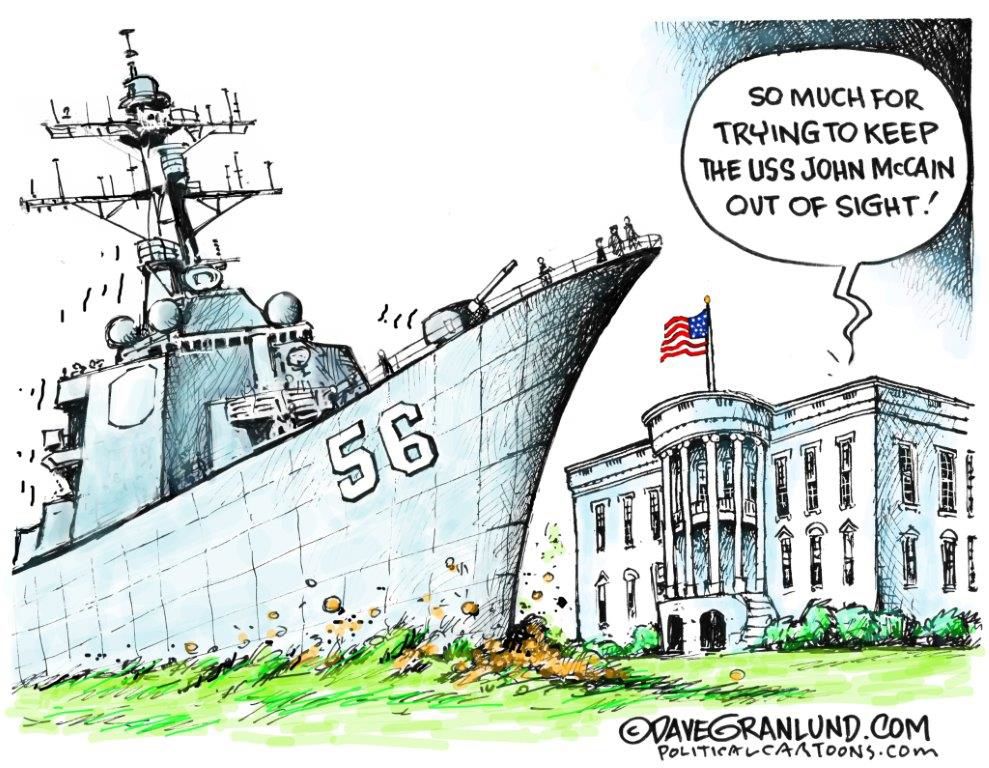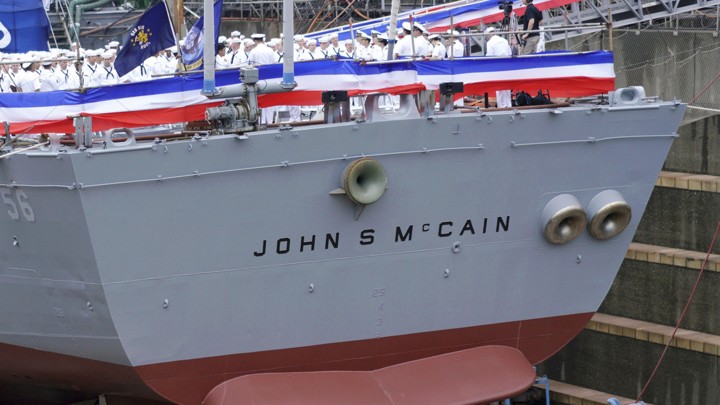Trump Is An Idiot's Idea Of A Genius
A Stain on the Honor of the Navy
One prays to the “Eternal Father, strong to save / Whose arm hath bound the restless wave” that The Wall Street Journal has got it horribly wrong. The newspaper reports that the United States Navy, under orders from the White House and with the approval of the acting secretary of defense and the compliance of a chain of naval officers in the Seventh Fleet, did its efficient best to conceal the name John McCain from President Donald Trump’s sight when he recently visited Yokosuka Naval Base.
The ship is under repair, so it could not be moved. But sailors hung a tarp over the ship’s name, and other measures (a strategically positioned barge) helped obscure the offending words. Sailors were told to remove all coverings that might indicate that the ship is the USS John S. McCain. They were, according to the article, given the day off, lest the name John McCain, embroidered on their caps, give offense. On the day of the presidential visit, some of the sailors present wore “Make Aircrew Great Again” patches, with something that resembled Trump’s profile on them. Subsequent stories in The New York Timesand The Washington Post amended the Journal’s story somewhat, to include the assertion that naval leadership intervened at the last minute to have the tarp removed. But the basic account remained intact.
Dishonor. Not to to the late senator, nor to his father and grandfather of the same name, who rendered the same distinguished service in war and peace. Their deeds and reputations are far beyond such mean contrivances. But dishonor indeed to the civilians and officers who hold the lives of young Americans in their hands and went along with this. That the president might wish such behavior is not surprising—he is mean, petty, and vindictive, and even if he did not order this (and he quickly tweeted a denial that he had), he signaled that he wished it. It is what is known in strongman governments as “working toward the Leader.” It is the effect of a personality that contaminates and corrodes every valuable thing he touches.
Former Secretary of Defense Jim Mattis would never have agreed to this. But his successor may well have gone along with it. He is, after all, only an acting secretary, and desires the real title from a boss who likes to string ambitious men and women along.
Naval officers of the past—a Preble or a Farragut or a Nimitz—would have disdained such requests. If called on the carpet, they would have spoken up and spoken back, with the firmness expected of officers from a service known for its ornery independence. But perhaps we have fewer of those these days. Petty officers in days gone by would have growled at their enlisted men and women to keep political statements off their shoulders, and enforced the political neutrality of the armed forces. But maybe they no longer understand that public displays of partisan attachment are anathema to good order and discipline. Maybe they wanted to wear MAGA hats, too.
That this could happen to the mightiest armed forces on Earth should worry Americans far more than reports of Chinese hypersonic missiles or ace Russian-military hacking teams. When large elements of the chain of command yield to illegitimate and morally corrupt demands of this kind, there is reason to fear veins of rottenness in the whole structure. When naval officers can agree to dishonor the memory of a real hero, who suffered five years of torment and refused early release, a statesman who in his first career was blood of their blood and flesh of their flesh, and who is buried on the grounds of the Naval Academy itself, the service is in a bad way.
Those who went along with these requests disgraced themselves and disgraced the oaths they took when they joined the service or became public officials. In a just world, they would lose their commissions or resign their posts, but they will not. They will burrow more deeply in. They will do so because it is the nature of the moral compromise of someone sworn to a demanding code that weakness begets weakness, yielding begets yielding, and cowardice begets still more cowardice.
Leadership teams at companies that act this way for a while eventually blow themselves up in scandal or bankruptcy. A financial reckoning comes sooner or later, and then the shareholders or the courts or scavenging capitalists slice up the remains. But there is nothing more perilous than an armed force without honor. Democratic peoples trust the armed forces with immense, almost inconceivable reservoirs of physical force and influence. That trust, once squandered, takes a long, long time to regain.
More dangerous, a service that tolerates sycophancy will get America’s sons and daughters killed, and lead them to defeat in America’s wars. War is not per se a test of character, but it is impossible to win one without it. In wartime, the kinds of behaviors on display in the White House, the Pentagon, Indo-Pacific Command, and the Seventh Fleet will mean that the readiness reports will be lies, the backup plans imaginary, and brave men and women will be led by courtiers, not commanders. Maybe some admirals and a senior civilian or two will resign in disgrace or shame, but that is doubtful. And those who did this or condoned it will remain in charge.
Undoubtedly, many serving member of the Navy and the other services will be outraged at such an indictment. If so, they should have hard conversations with those who serve alongside them, and with their superiors, whose craven conduct is a danger to them, and to all Americans. Because if they do not call them out, no one will.
The saddest part of this presidency is not the behavior of the commander in chief of the armed forces. Everyone knew what he is and how he was likely to behave from well before he won the presidency. The saddest part is what he reveals about individuals in high places, and institutions that we once thought relatively free from moral rot. What this episode shows is that the black fungus of fear, and ambition, and servility is more pervasive than might have been imagined. It stains uniforms even as it has stained business suits. The president has merely brought it to the surface.
The first stanza of the Navy Hymn ends, “Oh, hear us when we cry to Thee/For those in peril on the sea.” Unfortunately, the peril they face is now shown to be far greater than one might ever have imagined.
We want to hear what you think about this article. Submit a letter to the editor or write to letters@theatlantic.com.
ELIOT A. COHEN is a contributing editor at The Atlantic and Robert E. Osgood professor at the Johns Hopkins University School of Advanced International Studies. From 2007 to 2009, he was the Counselor of the Department of State. He is the author most recently of The Big Stick: The Limits of Soft Power and the Necessity of Military Force.



No comments:
Post a Comment